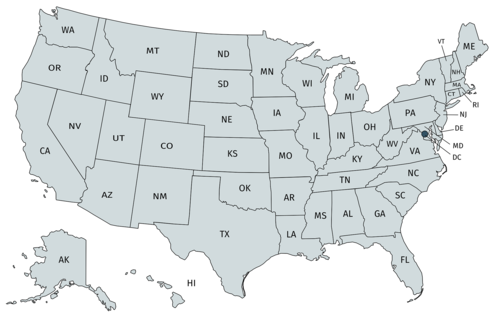Can Fossil keep its profits after using counterfeit fasteners on its handbags?
In the United States Supreme Court
| Argument | January 14, 2020 |
| Decision | Apri 23, 2020 |
| Petitioner | Romag Fasteners, Inc. |
| Respondent | Fossil, Inc., et al. |
| Court Below |  Federal Circuit Court of Appeals (D.C.) |
Case Decision
On April 23, 2020, the Supreme Court decided the case in favor of Romag.
Scroll down for our Decision Analysis.
January 13, 2020
In 2002, Fossil agreed to use Romag fasteners in Fossil’s handbags. In 2010, Romag discovered that Fossil handbags included counterfeit ROMAG branded fasteners.
The suit
Romag sued Fossil for trademark infringement, and a jury found that Fossil infringed Romag’s trademark rights. The jury also concluded that Fossil recognized a risk that its Chinese suppliers may be using counterfeit fasteners. The jury awarded Romag about $6.8M of Fossil’s profits to prevent Fossil from profiting from the infringement and to deter future infringement.
Willfulness
However, the lower courts held the law requires “willful” infringement to award profits. Romag was not able to prove Fossil was actually aware of the infringing activity, or that Fossil intentionally shielded themselves from discovering the truth. Therefore, the lower courts concluded Fossil’s infringement was not “willful” and Romag was not entitled to the $6.8M of Fossil profits.
Issue in the Supreme Court
This case will turn on whether willfulness is a threshold requirement for a trademark owner, such as Romag, to recover profits from an infringer. If the law requires willfulness, Fossil will not need to share its profits with Romag. If the law does not require willfulness, the lower courts may need to reconsider their decisions.
The Lanham Act
Federal law in the United States prohibiting trademark infringement is codified in the “Lanham Act.” Section 1117(a) of the Lanham Act authorizes the recovery of profits in cases of trademark infringement. Section 1117(a) of the Lanham Act states:
When a violation under section 1125(a) or (d) of this title, or a willful violation under section 1125(c) of this title, shall have been established . . . the plaintiff shall be entitled . . . subject to the principles of equity, to recover (1) defendant’s profits, (2) any damages sustained by the plaintiff, and (3) the costs of the action.
The jury concluded that Fossil violated section 1125(a) by selling handbags that included counterfeit ROMAG branded fasteners. Sections 1125(d) (cyber piracy) and (c) (trademark dilution) are not at issue in this case. However, sections 1125(a), 1125(c) and 1125(d) are all referenced in section 1117(a). Therefore, differences in how section 1117(a) refers to 1125(c) and 1125(d) may inform how to interpret the authorization to recover profits under section 1125(a).
Romag’s argument
Romag argues that there is no willfulness requirement in the statute. To the contrary, section 1117(a) states that only a violation of section 1125(c) must be willful to recover profits. This implies that a violation of section 1125(a) does not need to be willful to recover profits. The only restriction imposed by section 1117(a) is that any award of profits must be “subject to the principles of equity.” Romag argues this phrase just means courts have the flexibility to tailor profit awards based on all relevant circumstances, including the infringer’s degree of culpability and amount of the award.
Fossil’s argument
Fossil argues that historically, a violation of 1125(a) always required willfulness. The phrase “subject to the principles of equity” imports this historical willfulness requirement into the statute. Furthermore, the legislative history gives no indication that the addition of the word “willful” in the Section 1125(c) context was intended to abrogate the historical willfulness requirement for Section 1125(c).
A note supporting Fossil’s view comes from a 2017 Supreme Court case, TC Heartland LLC v. Kraft Foods. There, Respondent argued Congress changed the meaning of one statute (28 U.S.C. § 1400(b)) when it amended another statute (28 U.S.C. § 1391). The Court held that when Congress intends to change the meaning of a statute, it provides a relatively clear indication of its intent to do so in the amended provision’s text.
In response, Romag contends that, historically, willfulness was not a uniformly applied threshold requirement to recovering profits. Courts utilized varying approaches and rationales for awarding profits.
Regional split
Lower courts are split on this issue. The Third, Fourth, Fifth, Sixth, Seventh, and Eleventh Circuits do not require a willful violation of section 1125(a) to award profits. In those circuits, the infringer’s intent is just one of several factors in a flexible analysis.
The DC, First, Second, Eighth Ninth and Tenth Circuits require a willful violation of section 1125(a) before awarding profits. In those circuits, no profits are recoverable unless the infringer acted willfully.
Design patents: a different context
In a different patent context — design patents — a patentee would be able to recover an infringer’s profits without proving willfulness. However, the recovery for infringement of design patents is not available as a “deterrent,” so the amount would have been substantially lower than what the trial court awarded to Romag in this case.
The Supreme Court will hear arguments on January 14, 2020.
DECISION ANALYSIS:
On April 23, 2020, the Supreme Court ruled unanimously in favor of the trademark owner in Romag Fasteners v. Fossil.
Romag, the trademark owner, sued Fossil for using counterfeit ROMAG branded fasteners in its handbags. A jury found that Fossil infringed Romag’s trademark rights and awarded Romag about $6.8M of Fossil’s profits. The lower courts held Romag was not entitled to profits because Fossil’s infringement was not willful. The Circuit courts had been split on this issue. The Third, Fourth, Fifth, Sixth, Seventh, and Eleventh Circuits do not require willfulness to award profits. In those circuits. The DC, First, Second, Eighth Ninth and Tenth Circuits did require willfulness before awarding profits.
Justice Gorsuch, writing for a majority of the Court, held willfulness is not a threshold requirement for recovering profits from a trademark infringer. The Trademark Statute does require willfulness as a precondition to awarding profits under certain sections (e.g., §1125(c) for trademark dilution). However, Romag proved Fossil violated a different section of the statute (§1125(a) for the false or misleading use a trademark) which has never required willfulness to obtain an award of profits. Furthermore, other sections of the Trademark Statute expressly provide a mens rea requirement (e.g., §§ 1117(b), 1117(c), 1118, 1114). The glaring absence of an express willfulness requirement in the section violated by Fossil (e.g., §1125(a)) indicates there is no such requirement.
Fossil also argued that historically in trademark disputes, courts required a showing of willfulness before awarding profits. Fossil argued this historical requirement is incorporated into the Trademark Statute by language stating trademark violations are “subject to the principles of equity.” The Court rejected this argument because it is built on the erroneous assumption that Congress would incorporate a willfulness requirement indirectly while it expressly required it elsewhere in the Trademark Statute. The more logical explanation of the phrase “principles of equity” is that willfulness is relevant, but not required, when fashioning an appropriate remedy.
Finally, Fossil argued that stricter limits on profit awards are needed to deter “baseless” trademark suits. The Court deferred to Congress on any such policy considerations.
Justice Alito filed a concurring opinion to clarify that in his view, the relevant historical case law does not show willfulness was ever an absolute precondition to obtaining profits. Justice Sotomayor also filed a concurring opinion to clarify, that in her view, an award of profits for innocent or good-faith trademark infringement does not comport with “principles of equity.”
Practically, in view of this decision, companies should be more cautious (e.g., conduct searching and obtain clearance opinions) before launching new products/brands to avoid trademark violation. Non-willfulness will not immunize an infringer against liability for an award of profits.


